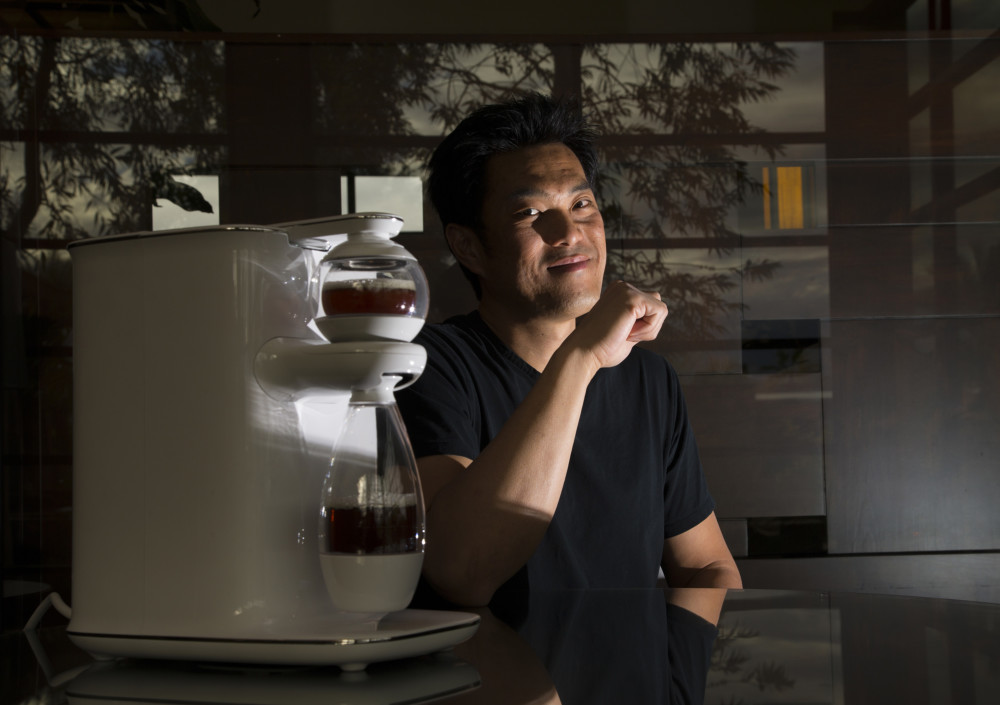By Tracey Lien
Los Angeles Times
WWR Article Summary (tl;dr) The “Teforia” is just one of the exciting new tea-related products to hit the marketplace. The “Teforia” downloads lab-tested tea recipes, allowing it to modulate the flavor, aroma, caffeine and antioxidant levels of each cup. Water passes though the vacuum-sealed infuser, sloshing the tea leaves around before releasing the brew into a bulbous carafe.
SAN FRANCISCO
Monica Shih has a pasta maker, an air fryer, a deep fryer, an ice cream machine and a popcorn maker in her kitchen. But her most expensive culinary gadget by far is her Teforia tea infuser, which retails for $1,499. She considers it an “investment.”
“I’m a huge tea drinker,” said the 42-year-old stay-at-home mom from Seattle. “I felt like it was something I would use every day.”
Jordan Peimer, 57, an arts administrator from San Diego, decided a Teforia was worth the cost considering how serious he is about tea.
“I like the idea of being able to get the most out of the actual tea itself,” he said.
It’s not crazy, Shih and Peimer insist: Look at how much people spend on coffee.
That’s the case that Teforia is trying to make for its pricey machine. The Mountain View, Calif., startup, founded by former Xbox, Amazon and Nokia industrial designer Allen Han, has 18 employees. Backed with $17 million in venture capital funding, Teforia hopes to be a trailblazer in the tea world, doing for tea what Keurig and Nespresso did for coffee.
When Keurig was bought by a private equity firm this year, “it was privatized at a value of $15 billion,” said Jay Eum, managing director of venture capital firm TransLink, which led Teforia’s $12 million Series A funding round. “Tea is a more consumed beverage than coffee is, so we’re excited to find a company and product that could be the Keurig of the tea market.”
There’s an elephant in the room, though. As any Starbucks barista will tell you, people are fussy about coffee. And if the proliferation of high-end coffee shops such as Blue Bottle is anything to go by, people can be outright snobs about it.
But tea? At $3 for 100 tea bags, most tea-drinking Americans seem content with dunking a bag into boiling water and calling it a day. What incentive could there be to change a cheap and deeply ingrained habit?
“Imagine a whole-leaf tea like a Kobe beef steak,” said Alessandra Ghini, Teforia’s chief marketing officer, who used to do marketing for Apple. “Let’s say you take it and ground it up. You can still make it taste good, but it will never taste the same.”
Teforia is selling its own tea, available in Keurig-style capsules, but owners of the machine also can use their own loose-leaf teas. The device connects to a mobile app in which users can tell the Teforia what kind of tea they’re using and what flavors they’d like to enhance.
The Teforia is Wi-Fi enabled and downloads lab-tested tea recipes, allowing it to modulate the flavor, aroma, caffeine and antioxidant levels of each cup by changing steep time, water temperature and aeration. Water passes though the vacuum-sealed infuser, sloshing the tea leaves around before releasing the brew into a bulbous carafe.
Han, Teforia’s founder, acknowledges that the whole process and price tag might seem like overkill to the average tea drinker.
“But if you go back 10 years, people were doing that with Folgers Instant Crystals, which is two cents per serving,” he said.
“It’s super convenient; it even works in cold water. You scoop up a spoonful, stir it in and you’re done.”
Compare that with today, where long lines at Starbucks for $5 specialty coffees are the norm, and it’s not hard to see Americans (or anyone around the world, for that matter) changing their attitude toward tea.
Things in the coffee world are getting fancier too: Starbucks Chief Executive Howard Schultz announced in December he was stepping down from the role to focus on Starbucks Reserve, an even sleeker version of the company’s shops that serves premium coffee the company roasts itself.
Teforia’s investors see opportunity in the $40 billion global tea market, especially in Asia, where tea culture is huge. The growing middle class in emerging markets could be a way in for the tea infuser.
“That’s our investment,” said Yves Sisteron, an investor at venture capital firm Upfront Ventures, which led Teforia’s $5 million seed funding round. “Enormous market size, lots of innovation, a disruptive service that’s above and beyond anything else out there and a great entrepreneur who understands tea very well.”
Investors realize that Teforia’s $1,499 price tag presents a major barrier to entry for most people, which is why the company plans to introduce a lower-end version, mirroring the progress of Keurig, which launched with a high-end version but also has budget options.
The company will initially target its premium machine at avid tea drinkers like Shih and Peimer. Its pre-order run of 500 units, which were discounted by more than half price, sold out in six weeks.
It could take years for tea to be treated like coffee, Teforia’s investors said. But the machine’s makers are hoping today’s tea drinkers will soon be converted into tomorrow’s connoisseurs.
“It definitely tastes a lot better,” said Shih, comparing the tea her Teforia brews with tea bags. At $1,499 a pop, one would hope so.














































































































































































































































































































































































